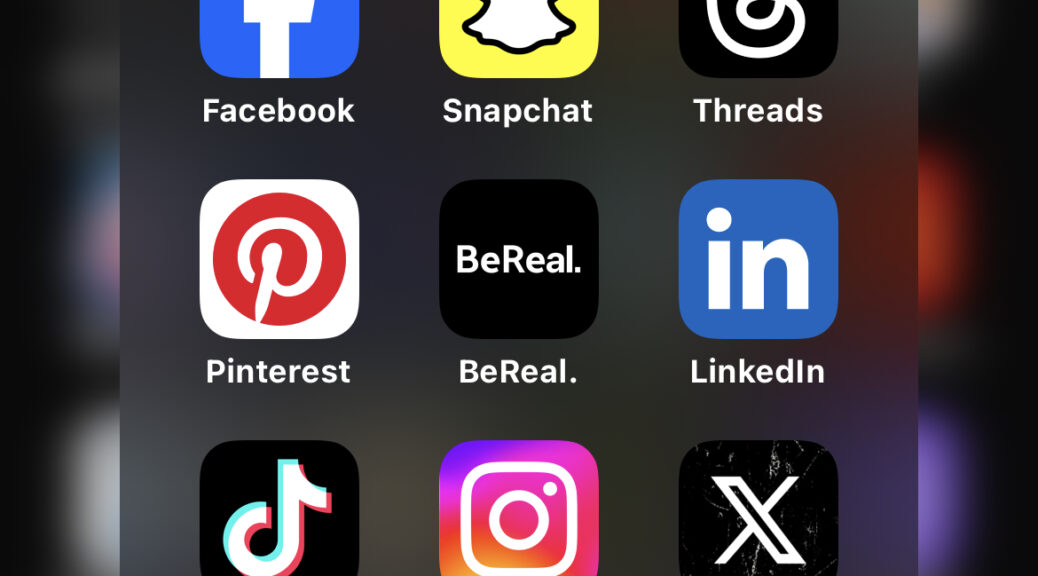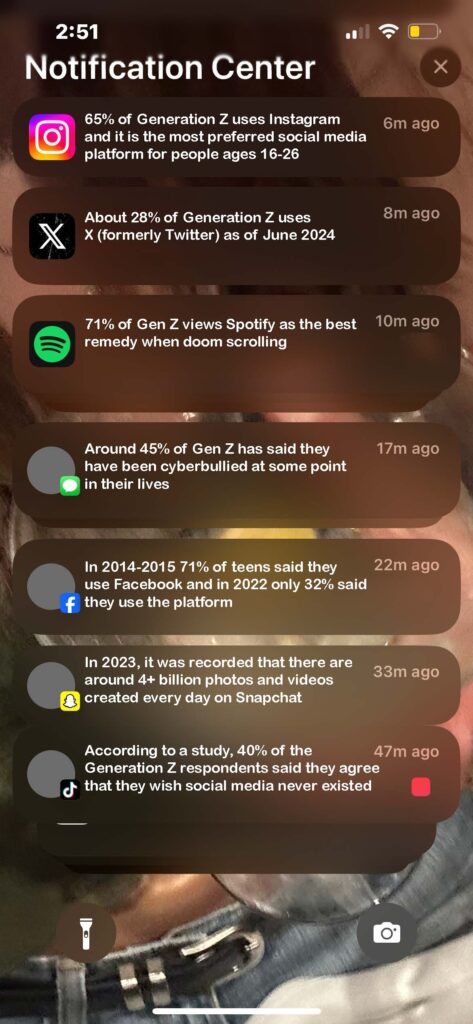
Gen Z Loves Social Media, But What Does It Actually Do For Them?
Generation Z’s are those who were born between 1997 and 2012 and are sometimes known as the “iGeneration” or “digital natives” according to the Library of Congress. This generation has not only grown up with the development of technology in general, but specifically the rise and advancement of social media. Social media has technically been around for a while; however, it is incontestable that it was ahead of its time in the beginning stages of it. But, in 2004, MySpace reached a million active users every month and this milestone can be interpreted as the beginning of the rise of social media. This timing allowed Gen Z to grow and evolve with social media, which pressured them to not only become experts in the online platforms, but also to almost completely base their lives on it.
While flawed, social media can be used in a healthy way, but that depends on the user. In an interview with Chloe Seeley, a Kent State fashion merchandising student, she talks about how social media has allowed her to stay connected with friends in different countries. Social media gives the opportunity to create and maintain friendships and relationships with others across the globe. Additionally, Seeley mentioned that social media can be used for fun and personal use, which another interviewee, Allie Girman, also pointed out. Girman, another Kent State student, said she likes to use social media to post and share what she is doing in life, with friends, etc. “I’m not a big doom scroller or anything, I’m using Instagram mainly. I just like to post what I’m doing and if I take pictures with my friends.”
As much as social media can be exciting and fun when posting personally as a form of expression and sharing one’s life, there can be significant consequences. A focus group study that involved 13 participants researched how social media affects their everyday behaviors, thoughts, actions, values, etc. When participants were asked about their fears of social media, some expressed their concerns with self-esteem, anxiety, cyberbullying, and isolation. Cyberbullying has caused a lot of mental health hardships for Generation Z due to the need for validation and comparison of others. Stefanie Moore, a School of Media and Journalism professor at Kent State, said “There are so many other negatives that we can talk about, comparing yourself to others, watching your friends out there [. . .] I think that that is a huge part of Gen Z, always looking for that validation online.”
Similarly, social media has been linked to a higher chance of fear of missing out (FOMO). FOMO can be defined as “the pervasive apprehension that others might be having rewarding experiences from which one is absent” according to The U.S. Surgeon General’s Advisory. When the negative sides of social media such as FOMO, doom scrolling, low self-esteem, and cyberbullying are combined, there is a high chance that user will have declining mental health and a negative perception of themselves.
On the other hand, social media has positive uses such as when users are trying to market themselves as a brand, or a company uses social media to showcase themselves and share their values and creativity with their followers. Specifically, within the fashion industry, social media can be used as a form of a portfolio or even part of a resume. For example, when Seeley was asked about this, she made the point that social media is a great way to build a personal brand and she even has her own business specific account for styling others, thrift hauls, and fashion tips. Girman mentioned a few of the same points when asked about using social media professionally. She supported the idea of using an Instagram page to showcase one’s work when it comes to styling or designing clothes because it is a great way to build a brand for oneself.
While interviewing Girman about what it has been like growing up with social media and seeing it from the beginning of its growth to now, she said, “I feel like when I was a little girl that really impacts you, because you have all these high expectations of consumerism and physical attraction/physical appearance [. . .] And I think it can really hurt us, thinking that we’re not doing well enough and basically prioritizing objects over our health or affording basic needs.”
Seeing influencers, celebrities, and viral posts about the creator’s attractiveness, financial situation, or incredible opportunity given to them can severely hurt someone else’s mental well-being. Comparison is something that has come naturally to Gen Z due to being chronically online for hours on end. Most of the time, comparison does nothing but hurt oneself image of themself. Professor Moore said, “I think one of the challenges is obviously being connected 24/7 because that does take a toll on your mental health after a while.”
Social media is truly a unique and overwhelming form of media that has a vast amount of opportunities, but at what cost? The ability to connect with friends internationally, express oneself creatively, and share one’s identity is something that Generation Z has mastered and treasured. However, with something so engaging and captivating, there are bound to be downfalls that come with it. Mental health is a key topic for Generation Z and while there is a lot of advocation and awareness surrounding emotional intelligence and well-being, studies have shown that social media can compromise one’s view of themselves, trust with oneself and others, and priorities.
Kylie Deatherage, a Gen Z Kent State student says, “Social media can be your greatest power, but it can also be your worst enemy. Use at your own risk, but always remember to protect your peace of mind.”
References
Dimock, M. (2019, January 17). Defining generations: Where millennials end and generation Z begins. Pew Research Center. https://www.pewresearch.org/short-reads/2019/01/17/where-millennials-end-and-generation-z-begins/.
Gen Z, social media, and Mental Health: Rollins School of Public Health: Emory University: Atlanta ga. Rollins School of Public Health | Emory University | Atlanta GA. (n.d.). https://sph.emory.edu/news/news-release/2024/05/gen-z-social-media-mental-health.html.
Gibson, A. (2023, May 17). How is social media affecting gen Z?. CASSY. https://cassybayarea.org/how-is-social-media-affecting-gen-z/.
Office of the Surgeon General (OSG). Social Media and Youth Mental Health: The U.S. Surgeon General’s Advisory [Internet]. Washington (DC): US Department of Health and Human Services; 2023. Available from: https://www.ncbi.nlm.nih.gov/books/NBK594761/.
Ortiz-Ospina, E., & Roser, M. (2024, March 18). The rise of Social Media. Our World in Data. https://ourworldindata.org/rise-of-social-media.
Research guides: Doing consumer research: A resource guide: Generations. Generations – Doing Consumer Research: A Resource Guide – Research Guides at Library of Congress. (n.d.). https://guides.loc.gov/consumer-research/market-segments/generations.Răduț, F., Sicrea, C., & Andrioni, F. (2023). The risks associated with the use of social media by generation Z. Technium Education and Humanities, 6, 12–28. https://doi.org/10.47577/teh.v6i.9613.
